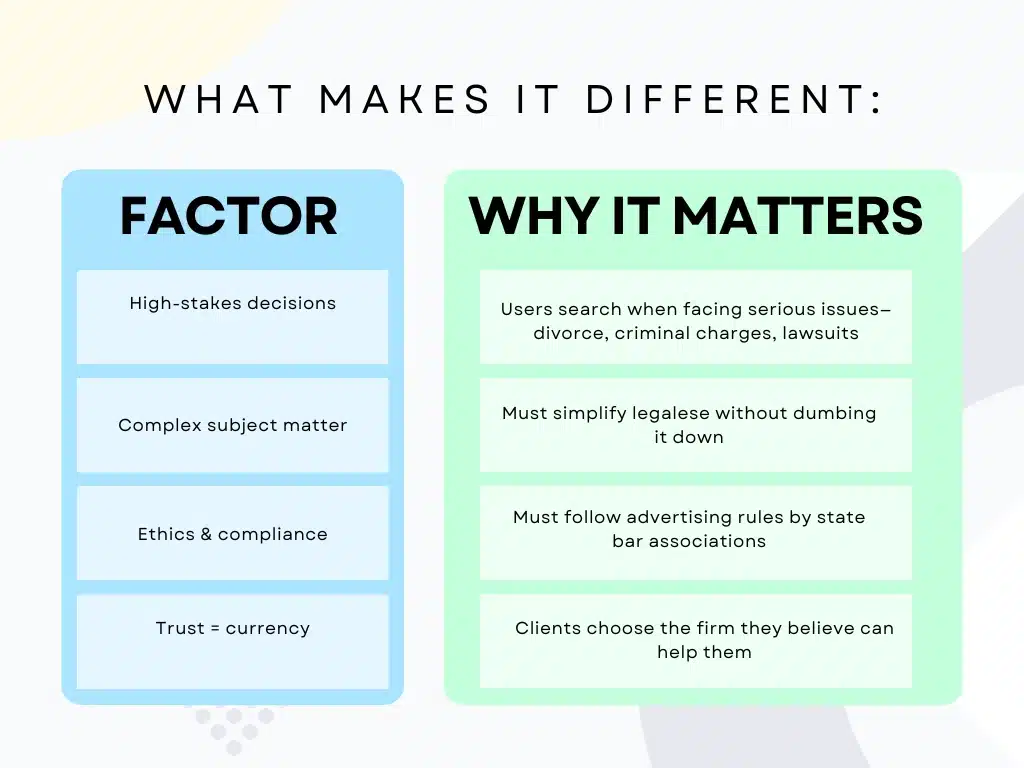Legal websites aren’t just online brochures anymore—they’re your top lead generation tool. Whether you’re a solo attorney or a large practice, your law firm’s content must be more than accurate. It needs to build trust, rank well on Google, and convert readers into paying clients.
In this 2025-ready guide, you’ll learn how to write content for law firms that educates potential clients, answers their legal concerns, and ranks locally—backed by insights from Clio, Semrush, Moz, and top-performing legal blogs.
1. Why Legal Content Needs a Unique Approach
Legal content writing is different from typical B2C content. You’re not selling a product—you’re selling credibility, confidentiality, and confidence in life-altering matters.

💡 Example: Instead of saying “We offer DUI defence,” say “Protect your driving record and future—speak with a DUI defence lawyer today.”
2. Know Your Audience: Who’s Reading Legal Content?
Before writing any legal page or blog, ask: What’s the reader going through right now?
Are they confused? Scared? Curious about their rights?
Create Reader Personas Based On:
-
Case type: Divorce, immigration, personal injury, criminal defense, corporate law
-
Stage of decision-making: Are they looking for general info or ready to call a lawyer?
-
Search intent: Informational (“What is no-fault divorce?”) vs. transactional (“Divorce lawyer near me”)
🔗 See how Nolo.com structures its content by legal category and user need
3. Pages Every Law Firm Website Needs
Many law firm websites have outdated or missing core pages. Here’s a must-have list to improve both SEO and user trust:
| Page Type | Why It’s Important | Notes |
|---|---|---|
| Practice Area Pages | Explain services clearly and thoroughly | One page per service (e.g., DUI, custody) |
| Attorney Bios | Humanizes your firm, builds trust | Include credentials + story |
| FAQ Page | Answers common concerns, boosts SEO | Format in Q&A schema |
| Blog Section | Educates and ranks for long-tail searches | Legal tips, new laws, case updates |
| Contact Page | Must be mobile-friendly and easy to use | Include map, phone, form |
| Testimonials/Results | Shows real success without violating bar rules | Use initials or anonymized stories |
4. Tone & Structure: Write Like a Lawyer (Who Understands Humans)
Legal readers don’t want fluff—but they don’t want cold, robotic writing either.
Balance Is Key:
-
Professional but approachable tone
-
Use simple, direct language
-
Define legal terms with plain-English explanations
-
Add empathy—acknowledge emotions when appropriate
✏️ Instead of: “A dissolution of marriage involves the legal termination of marital obligations.”
💬 Try: “Divorce can be emotionally draining. We’re here to guide you through every legal step.”
5. SEO for Law Firms: Ranking Locally is Critical
Nearly all legal searches are local in nature. People want a lawyer near them—and Google knows it.
Key SEO Tactics for Legal Writers:
-
Local keyword targeting: Use “[practice area] + [city]” (e.g., “DUI attorney in Dallas”)
-
Google Business Profile integration: Link from your content to your listing
-
Schema markup: Add local business, FAQ, and legal service schema
-
Internal linking: Connect related practice pages and blog posts
-
Fast load time + mobile optimization: Especially important for users in distress
🔗 Explore Semrush’s Legal SEO Guide for current best practices
6. Types of Content That Work for Law Firms
Not every content type is equal. Some content builds trust, others drive traffic, and a few do both.
| Content Type | Goal | Best For |
|---|---|---|
| Practice Pages | Service explanation | SEO, conversions |
| Blog Articles | Education, SEO | Attract top-of-funnel visitors |
| Case Studies/Results | Build credibility | Bottom-funnel, lead conversion |
| Video Transcripts | Accessibility + SEO | YouTube repurposing, FAQs |
| Guides (e.g. “Steps After Arrest”) | Lead magnets | Email list growth, authority building |
| Newsletter Content | Stay top-of-mind | Past and potential clients |
📌 Pro Tip: Use tools like AnswerThePublic and AlsoAsked to generate legal content ideas from real user queries.
7. Bonus: Legal Content Compliance Checklist
| Requirement | Why It Matters |
|---|---|
| Avoid guarantees or promises | Most bar associations prohibit this |
| Cite laws and sources accurately | Boosts trust and credibility |
| Disclaimers for legal advice | Required in many jurisdictions |
| Include attorney contact info | Required for transparency and compliance |
| Follow your state bar’s ad rules | Noncompliance can lead to penalties |
Summary Table
| Strategy | What It Does | Ideal Use Case |
|---|---|---|
| Local keyword targeting | Ranks for city-specific legal searches | Practice pages, blog posts |
| Plain-language explanations | Builds trust with non-lawyer readers | Blog, FAQs, landing pages |
| Practice area content | Showcases legal expertise | Core service pages |
| Trust-building bios/testimonials | Converts leads who value reputation | Attorney bio pages |
| Blogging about new laws | Drives timely, relevant search traffic | Monthly content calendar |
Final Thoughts
Content writing for law firms isn’t just about ranking—it’s about helping people make one of the most important decisions of their lives: hiring the right attorney.
When your content is well-written, structured, and ethically optimized, you earn more than traffic—you earn trust.
👉 Want content that builds credibility and clients? Explore our legal content writing services tailored for law firms.














